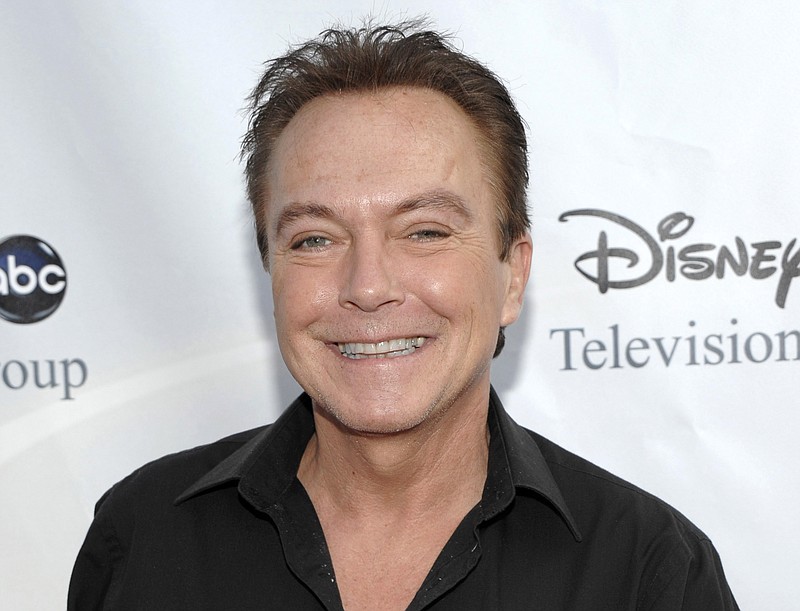Actor and singer David Cassidy recently made headlines by announcing he expected to be a victim of dementia because his mom and granddad developed the disease. But doctors say dementia is not normally inherited and there are ways to delay its onset.
Cassidy, 66, best known for his role on "The Partridge Family," revealed in February he had been diagnosed with dementia, a condition he said killed his mother and grandfather. He announced he was stopping touring after having trouble remembering the lyrics to his songs at a recent concert.
But dementia experts say anyone who appears to be suffering from dementia should get a thorough evaluation to determine if that is really the case and, if so, to figure out what form the dementia is taking.
"Dementia is not a disease," said Dr. Matthew Kodsi, a neurologist and chief of staff at CHI Memorial Hospital. "Dementia means someone has memory and general thinking problems that make it difficult to be independent."
The diseases causing those problems include Alzheimer's and Parkinson's, as well as poor circulation in the brain after a stroke.
"It is usually degenerative, and it usually gets worse over time," said Dr. Berneet Kaur, a dementia specialist at Erlanger hospital. "That could mean a change in cognition, it could be memory, it could be language or spatial function. Or it could be a change in behavior meaning anxiety, or depression or hallucination, sleep problems, appetite changes - all together they lead the patient to lose their independence. Loss of independence is the most important part of the dementia diagnosis."

The most common form of dementia is Alzheimer's, an incurable and progressive disease. The cause of Alzheimer's is not clear, although researchers believe it probably is linked to a buildup of plaque between nerve cells in the brain or tangles in those cells.
"Age is the No. 1 risk factor, although that does not mean everybody who gets older gets dementia," Kaur said. "In your 80s, it is around 40-50 percent. In your 60s, it is more like 10-15 percent, and in your 70s, 20-30 percent. But it is still not automatic."
Some people who get Alzheimer's at an earlier age, called early onset Alzheimer's, apparently have a genetic predisposition for it. Cassidy's family might fit that category.
But dementia could also be a sign of Parkinson's, which in its more advanced stages may include dementia, tremors and difficulty moving.
Or dementia could be a sign of blockages in the small blood vessels in the brain, often caused by a stroke.
"In some people, you can have two or three things happening at the same time. You can have Alzheimer's and a vascular stroke and Parkinson's," Kaur said. "We have cured Alzheimer's and dementia many times in mice, but we have never been able to translate that to human beings. In humans, it is more complicated than anything we can model with a mouse. It is an incredibly humbling disease."
Doctors say it is not clear whether dementia is becoming more common or whether there is a greater awareness of it.
"For years, we used the term 'senile dementia,' which meant the dementia of old age, which implied it was part of the normal aging process," Kodsi said. "We have come to realize that it is not, so it is not clear if we are diagnosing it more because we are accepting it less as the norm."
Kaur cautioned that some of what appear to be symptoms of dementia may have other causes, such as over-medication.
"A lot of times, what happens is a patient will go to a physician with a particular complaint. We want a quick solution and the quickest solution is a medication," she said. "For instance, someone has a problem sleeping, so you go to the local pharmacy and get over-the-counter sleeping aids. Perhaps a better route would be to ask the patient what problems they are having with sleep and see if there are other things we can do to treat that which may not be medication-related. Because a lot of sleeping pills have memory loss as a side effect. If we can address the sleep deprivation, then we may not have the memory loss."
While there are no cures for dementia, diet and activity may play a role in delaying its onset.
"Staying active mentally, doing mental exercises, keeping your brain fit" all seem to help, CHI Memorial's Kodsi said. "There are also a lot of dietary suggestions. As we age our body tends to rust, because we are dependent on oxygen. There are theories that many diseases may be partly caused or made worse by oxidation in the brain and other organs. So take antioxidants such as blueberries, raspberries, turmeric or curry."
Erlanger's Kaur recommends what is often called the Mediterranean diet: "eating fish two or three times per week and eating lots of fruits and vegetables, lots of grains and nuts and lentils. And minimizing your exposure to red meat. Eat lean meats, poultry or fish if you eat meat," she said.
Contact staff writer Steve Johnson at 423-757-6673, sjohnson@timesfreepress.com, on Twitter @stevejohnsonTFP, and on Facebook, www.facebook.com/noogahealth.
